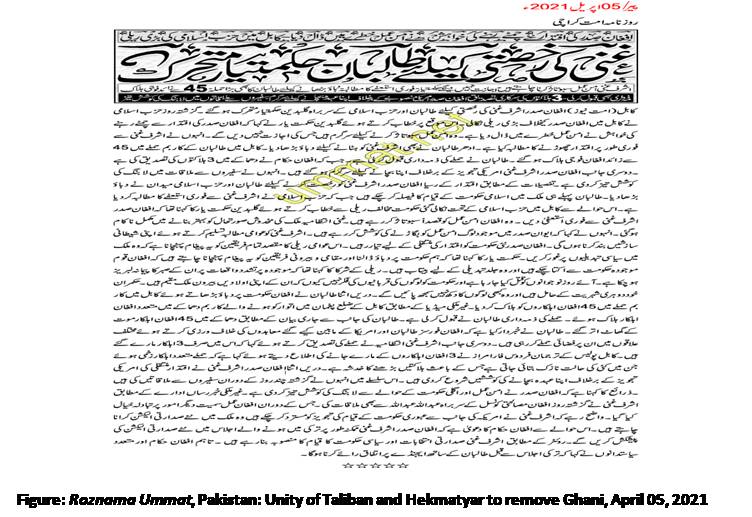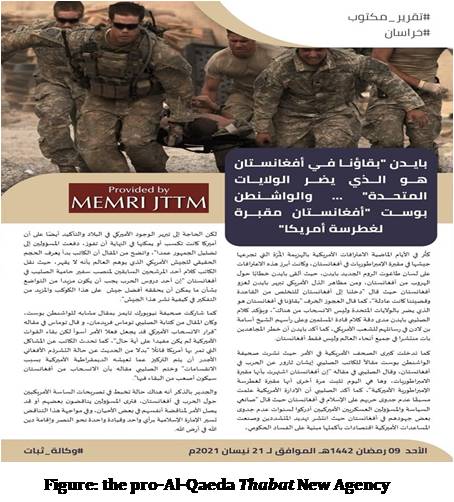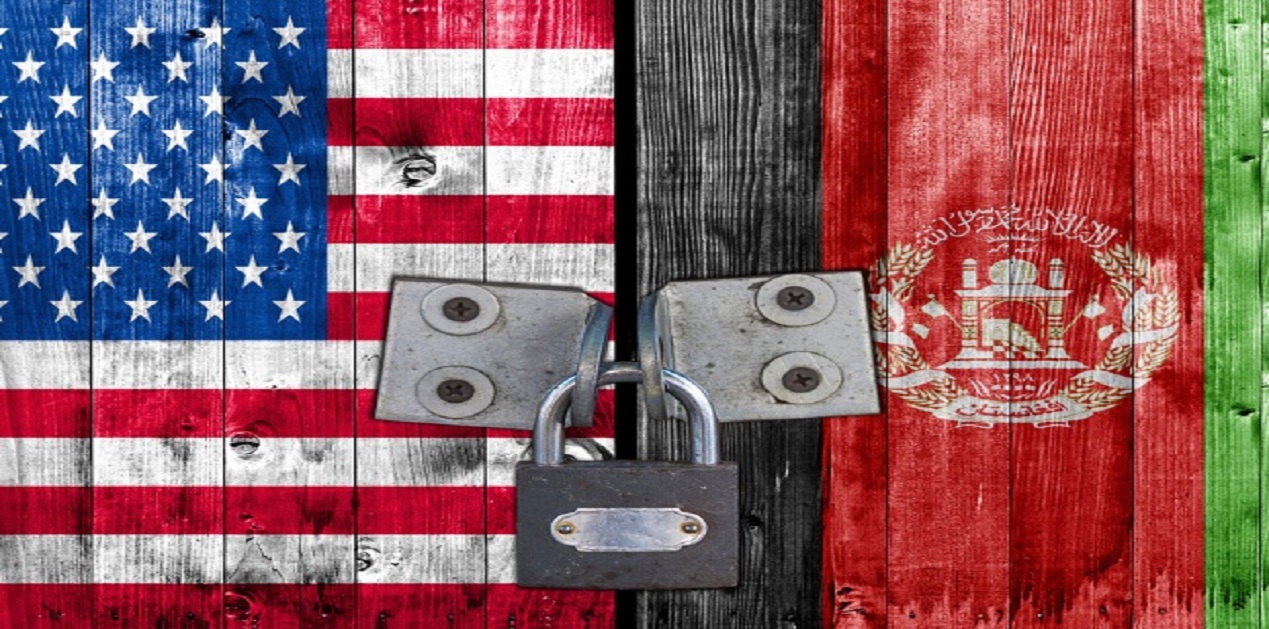In the last sequel of the Marvel series movie, “The Endgame”, Avengers including the idol leader Captain America- the symbol of freedom, justice and the “American Way”- fights the evils of the universe like Thanos, who plans to destroy the earth and repopulate it with his kind of people. However, the movie ends with the decimation of Captain America and his team of Superheroes. Something similar we are witnessing today in the modern-day game of geopolitics where ultimately the United States is surrendering to Thanos and his cohorts (read Taliban).
This paper will discuss the U.S. withdrawal from Afghanistan in 2021 and how the three most dreadful terror groups, namely Taliban, Al Qaeda, and Islamic State-Khorasan Province (IS-KP), are placed in the matrix of regional geopolitics.
Introduction
The American troops entered the ‘graveyard of empires’ in October 2001 with its first airstrike on Al Qaeda and the Taliban as a response against the September 11, 2001 attack on the twin towers.
Operation Enduring Freedom -an official name used by the U.S. government for the Global War on Terror in Afghanistan is under scrutiny today. The war against radical Islam and to establish democracy, replace the madrassas with the modern-day education system has miserably failed to bring any significant and visible changes.
It raises numerous questions about how far the United States has been successful in ensuring the ‘endurance’ of freedom for the people of Afghanistan?
Despite the long struggle to bring back democracy in Afghanistan, all that is visible is the weak governance under the current leadership. The entire state structure suffers from a number of infirmities due to a variety of reasons. The inherent weakness in the security system and governance has led to the strengthening of the Taliban and increased the possibility of its returning to the pre-2001 barbaric regime. U.S. President Joe Biden recently announced September 11, 2021, as the exit date from Afghanistan.1 As a result, the curtains on the ‘war on terror will be drawn- so the game ends here.
Mohammad Naeem, the spokesman of the Islamic Emirate, tweeted: “Until all foreign forces completely withdraw from our homeland, the Islamic Emirate will not participate in any conference that shall make decisions about Afghanistan.” The decision was taken in consensus with the Shura (Islamic Experts council).

The Taliban’s backing out of the peace dialogue in Turkey shows that they are not interested in power-sharing, ending violence, or defining peaceful coexistence. As a result, Afghanistan has neither witnessed peace in the presence of the U.S. and its allies nor is expected to witness post their withdrawal. And as far as the question of bringing an end to global jihad and radical Islamism is concerned, we have seen none, despite the U.S. being there for almost twenty years.
Where does Afghanistan Stand Today?
A survey conducted by the Pajhwok Afghan news between November 2020 and February 2021 shows that the Taliban control around 59 per cent of the Afghanistan territory. Around 27 districts are still under Taliban control, where the locals live under the strict Sharia (Islamic laws).2 The methods of punishments and system of governance are still as per the age-old Islamic traditions.
The war in Afghanistan gave birth to several jihadi campaigns worldwide spread over Syria, Africa, Iraq, and some parts of Asia. The Afghan campaign has become a tool for the radical Islamist groups to recruit and mobilise more and more fighters to die in the name of the religion. The international agencies are not permitted to work, and women are absent from civic life. Life, in short, is still governed by the stringent Islamic interpretation of Islam, which is almost draconian.
Objection to female education was a prime feature of Taliban rule, which continues to exist till date in certain parts under the Taliban control with certain exceptions, like in North and Central regions where they have permitted to open schools for girls. However, in areas like Helmand and Uruzgan, the girls are still deprived of primary education. 3
U.S. withdrawal is Equal to Victory of Radical Islamist Groups
The matrix of global terrorism is rapidly evolving. Often in the past, terrorist groups have been able to gain power through strategic operations. The next few years will be critical to Afghanistan’s security systems and its integration in South Asia.
Taliban
According to an Urdu newspaper Roznama Ummat in Pakistan, since the time the United States has announced its hasty withdrawal from Afghanistan, the Taliban and its offshoot, the Tehrik-e-Taliban Pakistan, view it as a victory for themselves. Hence it is an opportunity for the radical Islamist groups to come together. In another news titled, “Hizb-e-Islami Active to Unite former Jihadis And the Taliban” in Roznama Ummat, former mujahideen leader and former Afghanistan Prime Minister Gulbuddin Hekmatyar, who were party to the peace process, initiated talks with jihadis and the Taliban making efforts to unite them once again.
An agreement was signed between the Taliban and Hizb-e-Islami in Russia endorsed by the Hizb-e-Islami shura, to adopt a joint strategy with the purpose of changing the constitution in Afghanistan as per Islam and establishing the Islamic Social Welfare Organization in Afghanistan. 4 According to news reports, the Taliban and Hekmatyar are opposed to the present Afghan government which in their view is upholding the democratic constitution of Afghanistan influenced by Western Democratic values. Hizb e Islami Chief stated, “Under the pretence of the interim government, Western democracy and the American agenda will not be allowed to enter Afghanistan”.
On April 5, the day before the report was published, the same newspaper stated, “The Taliban And Hekmatyar Active for President Ghani’s Rukhasti” (departure). The Taliban have already decided to establish an Islamic government in the country, the report said. The Taliban had long sought to establish a sharia-based theocratic government. It has always been the prime objective for the Taliban.

The Islamic Emirate had stressed the need for a “pure Islamic system” in Afghanistan.5 The Taliban rejected Western democracy and represented the Sunni Hanafi-based sharia system, which would be the Sunni royal monarchy of a theocratic state in which the government would be governed by the Shura (a sharia-based Taliban council).
In October 2020, seven months after the Doha agreement, Zabihullah Mujahid, the spokesman of the Islamic Emirate, stated in an interview: The obligation of jihad remains and shall continueuntil the ‘word of Allah’ rules supreme, the Islamic government is established, and the mujahideen and Afghans, in general, feel confident that their self-sacrificing goal has been achieved - but until such a result, jihad will remain legitimate and continue, Allah acknowledges.” 6
He added: “The goal of jihad, which is the establishment of Islamic law described as ‘raising the voice of Allah’ in Sharia literature (Islamic law), is yet to be achieved. Therefore, until the ‘raising of the voice of Allah’ reigns supreme in the country and until the Islamic State is achieved, Afghans remain obligated to wage jihad.” 7
Mujahid cited another source of Sunni jurisprudence: “One more subject found on page 250 of another authoritative book of jurisprudence, Fatwa Kamilya, states: “... If unbelievers conquer and settle in the world, and if a group of Muslims will come to help the apostates and start killing their own Muslim brothers, confiscate their wealth, praise the power of the unbelievers, and then start fighting against the Muslims. In such a case what must be done? Mujahid answered by saying, “Our books of jurisprudence make it unambiguously clear that those who aid and help the unbelievers can be killed and their wealth can be seized, however if they apologise and renounce their actions, they can be forgiven by the Muslims.” 8
Around seven months before the historical Doha Accords, the Islamic Emirate had sought to establish an Islamic Emirate government in Taliban-occupied territories in Afghanistan, under Mullah Abdul Ghani Baradar Akhund, which was apparently supported by the Chinese, Russian, Iranians, and perhaps Pakistan, the creator of the Taliban. 9
Likewise just few weeks after the Doha agreement, Mullah Abdul Ghani Baradar Akhund, delivered a speech in a training centre of Taliban, namely- Khalid bin Al-Waleed Camp, Al-Fateh Camp, and Hazrat Abu Bakr Siddique Camp. 10 The video was titled, “Victorious Force” and the video showed deputy emir of Islamic Emirate -Sirajuddin Haqqani, head of the Haqqani Network, Maulvi Mohammad Yaqoob, and Zabihullah Mujahid, a spokesman for the Islamic Emirate. 11 They all were seen honouring various martyrdom groups of Taliban.
Al Qaeda
Al Qaeda, which has pledged allegiance to the Taliban emir, celebrated America’s “shameful defeat”. The mujahedeen of the Islamic Emirate must make a rigorous effort toorganise their forces, for them to grow in power and achieve their great goal. The statement concludes with a prayer that Allah will “direct all our people” to Afghanistan, Palestine, the Muslim Maghreb, East Africa, the Levant, and other Muslim countries elsewhere. 12
On April 20, 2021, the pro-Al-Qaeda Thabat News Agency published an article via Telegram in response to Biden’s call for withdrawal from Afghanistan. The article criticised Biden’s statement, it said: “Crusader’s speech confirms the accuracy of the statements made by Muslim leaders, especially Sheikh Osama Bin Laden in his message to the American people. The news on telegram by al Qaeda also cited the article by Ishaan Tharoor titled “Afghanistan Becomes American Cemetery Hubris” 13 discussing the war in Afghanistan. Thabat News took pleasure in highlighting how the author of the article has referred to Afghanistan “as the tomb of the American hubris.” The Islamic Emirate (Taliban) is marching with one mind and with a leadership towards achieving success and establishing the religion of Allah in His country. 14
A United Nations Security Council report revealed:“Al-Qaeda is covertly active in 12 Afghan provinces especially in the Taliban-controlled areas like Badakhshan, Ghazni, Helmand, Khost, Kunar, Kunduz, Logar, Nangarhar, Nimruz, Nuristan, Paktiya and Zabul”. “Al-Qaeda leadership detailed in meetings with the Taliban have included Ahmad Al-Qatari..., Sheikh Abdul Rahman... Hassan Mesri (aka Abdul Rauf) ... and Abu Osman... a Saudi Arabian member of Al-Qaeda.” 15

Islamic State of Khorasan Province (IS-KP)
Islamic State of Khorasan Province (IS-KP) today is undoubtedly the most visceral ISIS wilayat (administrative division), which has the power to organise some of the most violent attacks. The first branch of I.S- KP, appeared in Achin village of Nangarhar province in eastern Afghanistan, where they came as migrants at first under the pretext of Tehrik-e-Taliban Pakistan (TTP) and eventually hosted the black flag and announced its Caliphate in 2015.
The Afghan and Pakistan bordering region became the birthplace of IS-KP and their activities are crucial to the Taliban-US negotiations. They will be playing a significant role to the kind of peace the Afghan people will enjoy in future. Indeed, Pakistani-based terror groups like TTP, LeT and Haqqani form a large IS-KP cadre. In addition, TTP the primary source of recruitment for the IS-KP also shook hands have common objectives as they both are more radical compared to Afghan Taliban and it is also anti-Pakistan. Hence, resurgence of Tehrik-e-Taliban Pakistan (TTP) and IS-KP in the region could soon pose a major threat to Pakistan. 16
The arrest of a Pakistani IS-KP leader Munib Mohammed known as a bridge between IS-KP, and Pakistani intelligence services highlights the many strategies Pakistan has used to ensure that post-US withdrawal, Afghanistan does not become anti-Pakistan. The Haqqani Network reopened relations with IS-KP on many fronts by supporting IS-KP in carrying out attacks in Kabul. The IS-KP poses a threat not only to Afghanistan and Pakistan, but also to security of South Asia. Its impact on South Asian security requires careful consideration of developing conditions in the Afghanistan-Pakistan region. As was noticed in the ISIS issue Sawt-al-Hind, dedicated a section to the online supporters of ISIS in South Asia.
It is important to remember that the Taliban, Al Qaeda, and IS-KP are only three of the many groups operating in the Afghan ecosystem. More than 20 terrorist groups are present on the Afghan soil and most of them are from Pakistan.
Where is the United States standing?
In early 2020, writing in the journal Foreign Affairs, Joe Biden had said that he would restore democracy to the world. “In my first year in office, the United States will organise and host a global conference on democracy to revitalise the shared spirit and purpose of a free world,” wrote Biden before he became president in January 2021. However, it seems that President Biden’s policy in Afghanistan is no different from that followed by his predecessor. It is undermining the future of democracy in Afghanistan. 17 Hence, in Afghanistan, Washington DC is sacrificing an emerging democracy in favour of a jihadi terror organisation and power grab by an Al-Qaeda ally.
Way Out
While there is no doubt that this is the defeat of the U.S. administration, much depends on what happens post-withdrawal of the U.S. forces from Afghanistan. A clear victory for the Taliban will also be the victory for Pakistan, which has played a vital role in the survival and expansion of the group for decades. Most likely, the United States could now negotiate its withdrawal plans with the Kabul government instead of betting everything on the Taliban, which in any case is celebrating their victory. 18 The White House could have rounds of meetings with the Afghan National Army (ANA) and continue to provide security infrastructure in Afghanistan by providing air support, arms, and ammunition, and other kinds of help in combating terror strikes.
The United States must now set realistic goals to protect Afghanistan, commit itself to sustainable support to Afghan security forces and continue bilateral talks. As former Ambassador Hussain Haqqani wrote, “American troops spent almost two decades in Afghanistan, not because it was a plan but because there were 19 plans for one year. This could be the time to make a long-term U.S. plan for Afghanistan’s future.”19 Thus, the U.S. withdrawal from Afghanistan must be well planned to ensure that the radical Islamist groups do not get a free run and the democracy is secured for the generations to come in Kabul.
Endnotes
- Speeches and Remarks (2021), ‘Remarks by President Biden on the Way Forward in Afghanistan’, The White House, April 14, 2021, https://www.whitehouse.gov/briefing-room/speeches-remarks/2021/04/14/remarks-by-president-biden-on-the-way-forward-in-afghanistan/
- Ahmad Shah Erfanyar, (2021), ‘Govt, Taliban make exaggerated claims of territory they control’, Pajhwok Afghan News, February 12, 2021, https://pajhwok.com/2021/02/12/govt-taliban-make-exaggerated-claims-of-territory-they-control/
- Susannah George and Aziz Tassal (2020), ‘How Life under Taliban rule in Afghanistan has changed- and how it hasn’t’, The Washington Post, December 29, 2020, https://www.washingtonpost.com/graphics/2020/world/asia/afghanistan-taliban-rule-territory/
- Roznama Ummat, (2021), ‘Hizb e Islami Chief Hekmatyar, In Effort to Unite Jihadi and the Taliban’, April 06, 2021,http://ummat.net/2021/04/06/index.php
- Statement of Islamic Emirate concerning anniversary of Liberation of Kabul on 6thMezan’, Voice of Jihad- Islamic Emirate of Afghanistan, September 27, 2020, http://alemarahenglish.net/?p=37640
- Interview: Voice of Jihad (2020), ‘Interview with Honorable Zabihullah Mujahid about recent developments’, Voice of Jihad: Islamic Emirate of Afghanistan, October 24, 2020, https://alemarahenglish.net/?p=38544
- Ibid.
- Ibid. No. 6
- Roznama Ummat, (2019), ‘The Islamic Emirate Government plans to for under Taliban control’, August 10, 2019, http://ummat.net/2019/08/10/
- Ibid.
- Al-Hijra Studio Video (2020), ‘Victorious Force (1)’, Voice of Jihad- Islamic Emirate of Afghanistan’, June 01, 2020, https://alemarahenglish.net/?p=35208
- Thomas Joscelyn(2020), ‘Al Qaeda General Praising the Taliban after Doha Accord’, FDD Long War Journal, March 17, 2020,https://www.longwarjournal.org/wp-content/uploads/2020/03/20-03-12-AQ-declares-Taliban-victory-AsSahab_Bayan-page-0011.jpg
- Ishaan Tharoor, (2021), ‘Afghanistan became the graveyard of America Hubris’, The Washington Post, April 15, 2021, https://www.washingtonpost.com/world/2021/04/14/afghanistan-graveyard-hubris/
- MEMRI (2021), ‘Pro Al Qaeda Outlet Deems Biden’s Withdrawal Decision Acknowledgement of ‘Bitter Defeat’ in Afghanistan, says Taiban Marche on Toward ‘Achieving Victory, Establishing Allah’s Religion’, April 21, 2021, https://www.memri.org/jttm/pro-al-qaeda-outlet-deems-bidens-withdrawal-decision-acknowledgement-bitter-defeat-afghanistan#_ednref2
- The United Nations Security Council, (2020), Eleventh report of the Analytical Support and Sanctions Monitoring Team submitted pursuant to resolution 2501 (2019) concerning the Taliban and other associated individuals and entities constituting a threat to the peace, stability and security of Afghanistan , 27 May 2020, https://www.ecoi.net/en/file/local/2030769/S_2020_415_E.pdf
- YouTube (2020), ‘Daesh In Afghanistan’, TOLO news Documentary, June 10,2020, https://www.youtube.com/watch?v=vhuKjaXMbCw
- Joseph R Biden Jr. (2020), ‘Why America Must Lead Again’, Foreign Affairs Magazine, March/April 2020, https://www.foreignaffairs.com/articles/united-states/2020-01-23/why-america-must-lead-again
- Secunderkermani and MahfouzZubaide (2021), ‘Afghanistan: “We Have Won the War, America has Lost’, say Taliban’, BBC New, https://www.bbc.com/news/world-asia-56747158
- Hussain Haqqani (2021), ‘American Withdrawal need not return Afghanistan to the Taliban’, The Hill, April 15, 2021, https://thehill.com/opinion/international/548378-american-withdrawal-need-not-return-afghanistan-to-the-taliban?rl=1
(The paper is the author’s individual scholastic articulation. The author certifies that the article/paper is original in content, unpublished and it has not been submitted for publication/web upload elsewhere, and that the facts and figures quoted are duly referenced, as needed, and are believed to be correct). (The paper does not necessarily represent the organisational stance... More >>
Image Source: https://wap.business-standard.com/article-amp/international/china-appeals-for-orderly-withdrawal-of-us-troops-from-afghanistan-120102201180_1.html











Post new comment